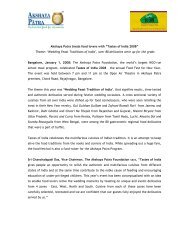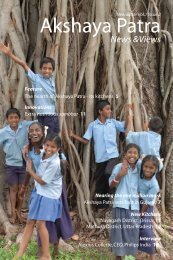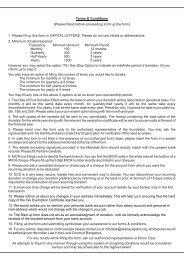The Top 100 NGOs 2013. - Akshaya Patra
The Top 100 NGOs 2013. - Akshaya Patra
The Top 100 NGOs 2013. - Akshaya Patra
Create successful ePaper yourself
Turn your PDF publications into a flip-book with our unique Google optimized e-Paper software.
sPecial FeaTure sPecial FeaTure<br />
© PaniThan kiTsakul/amnesTy inTernaTional © amreF © PraTham usa © iDe<br />
© riDers For healTh<br />
© sam PhelPs<br />
27 28 29 30<br />
31<br />
32<br />
<strong>The</strong> soul oF <strong>The</strong> human righTs movemenT lasTing healTh change in aFrica low cosT eDucaTional inTervenTions harnessing irrigaTion Technology For gooD <strong>The</strong> ‘lasT mile’ oF healTh care Delivery healTh workers on <strong>The</strong> FronTline<br />
Amnesty<br />
International<br />
8 53<br />
7 NEW NEW<br />
7<br />
By now, Amnesty International<br />
needs no introduction.<br />
Established by lawyer Peter<br />
Benenson in 1961, the organization<br />
has amassed more than three million<br />
supporters, members and activists<br />
in over 150 countries. <strong>The</strong> popular<br />
touchstone of the global human rights<br />
movement, Amnesty International<br />
engages with governments, armed<br />
political groups, companies and other<br />
non-state actors, seeking to disclose<br />
human rights abuses and mobilize<br />
public pressure to address both<br />
individual cases and normative change.<br />
Though less innovative in its methods<br />
as they have become organizationally<br />
entrenched over time, Amnesty<br />
International remains an important<br />
independent voice in the international<br />
arena, speaking fearlessly to power and<br />
pursuing a new focus on overlooked<br />
economic, social and cultural rights.<br />
AMREF Pratham iDE<br />
Riders for Health MERLIN<br />
hQ locaTion: uniTeD kingDom hQ locaTion: kenya hQ locaTion: inDia hQ locaTion: uniTeD sTaTes<br />
hQ locaTion: uniTeD kingDom<br />
hQ locaTion: uniTeD kingDom<br />
Aseeming rarity in today’s<br />
crowded public health field,<br />
AMREF is an African-led NGO<br />
focused on developing indigenous<br />
solutions to African health challenges.<br />
Founded in 1956 as part of a plan to<br />
provide mobile medical assistance<br />
to remote regions in the east of the<br />
continent, the organization has evolved<br />
into a multifaceted institutional<br />
actor working on a diverse range of<br />
health issues with over <strong>100</strong> poor and<br />
marginalized rural and urban slum<br />
communities – from HIV/AIDS and<br />
malaria, to water and sanitation,<br />
surgical outreach and practitioner<br />
training. Committed strongly to<br />
building the capacity of local health<br />
systems, AMREF has emerged as a<br />
pioneer in community-based health<br />
care, as well as a regional leader in<br />
maternal and child health.<br />
<strong>The</strong> gloBal Journal + January & FeBruary 2013<br />
Now the largest educational<br />
NGO in India, Pratham was<br />
founded in 1994 to address<br />
teaching gaps in the slums of Mumbai.<br />
From those humble beginnings, the<br />
organization has expanded in scope and<br />
geographical coverage, teaching English<br />
and computer literacy, establishing<br />
libraries, publishing books and offering<br />
comprehensive learning support. Since<br />
its inception in 2007, Pratham’s flagship<br />
program, ‘Read India’ – which aims to<br />
catalyze existing resources at the village<br />
level to train teachers and harness<br />
domestic volunteers – is active in 38,000<br />
villages, reaching over two million<br />
children in 2011 alone. Similarly,<br />
the organization’s ‘Annual Status of<br />
Education Report’ has become a crucial<br />
influence on evidence-based state<br />
policy planning.<br />
One of the leading voices in<br />
the ‘appropriate technology’<br />
movement, psychiatrist turned<br />
social entrepreneur Paul Polak founded<br />
iDE in 1982 as an organization devoted<br />
to the manufacture, marketing and<br />
distribution of affordable, scalable<br />
micro-irrigation and other low-cost<br />
water recovery systems throughout the<br />
developing world. Envisioning the rural<br />
poor as potential entrepreneurs and<br />
customers rather than charity recipients,<br />
iDE relies on local manufacturing,<br />
retailing, and maintenance resources<br />
to make affordable technologies<br />
available to farmers. <strong>The</strong> organization’s<br />
emblematic success has been the<br />
‘treadle pump’ – a more efficient<br />
and user-friendly technology than<br />
traditional manual pumps. More<br />
than 1.5 million have been sold in<br />
Bangladesh alone, creating $1.4 billion<br />
in net additional income per year.<br />
As in many other impoverished<br />
regions, the majority of the<br />
population of sub-Saharan<br />
Africa lives in rural areas where the best<br />
roads are little more than dirt tracks.<br />
Without reliable transport, the millions<br />
invested in health materials and training<br />
will be wasted. Identifying this crucial<br />
gap, husband-and-wife team Barry and<br />
Andrea Coleman established Riders<br />
For Health in 1996. <strong>The</strong> organization<br />
manages over 1,400 motorcycles,<br />
ambulances and other four-wheel<br />
vehicles used in the delivery of health<br />
care in eight countries across Africa,<br />
including local training and preventive<br />
vehicle maintenance. Charging partners<br />
a fee to ensure the sustainability and<br />
scalability of the model, Riders For<br />
Health has already improved access to<br />
health care for over 12 million people.<br />
<strong>The</strong>gloBalJournal.neT<br />
62 63<br />
At the age of 30, Christophe<br />
Besse left his job treating the<br />
rich and famous in an exclusive<br />
London clinic, to “do some proper<br />
work.” Founding MERLIN in 1993<br />
with two friends, the organization went<br />
through a baptism of fire in war-torn<br />
Bosnia. Twenty years later, it numbers<br />
6,000 staff reaching an average of 20<br />
million people per year in 17 countries,<br />
including operationally challenging<br />
locations like Afghanistan, Pakistan<br />
and the Democratic Republic of the<br />
Congo. More than a humanitarian<br />
relief actor, MERLIN stays on to assist<br />
recovery in the long-term, building the<br />
capacity of local health care workers and<br />
embedding best practices to increase the<br />
resilience of at-risk communities in the<br />
face of future shocks.





